March-April 2003
A Walk In The Forsaken Land
By Peter H Guevara
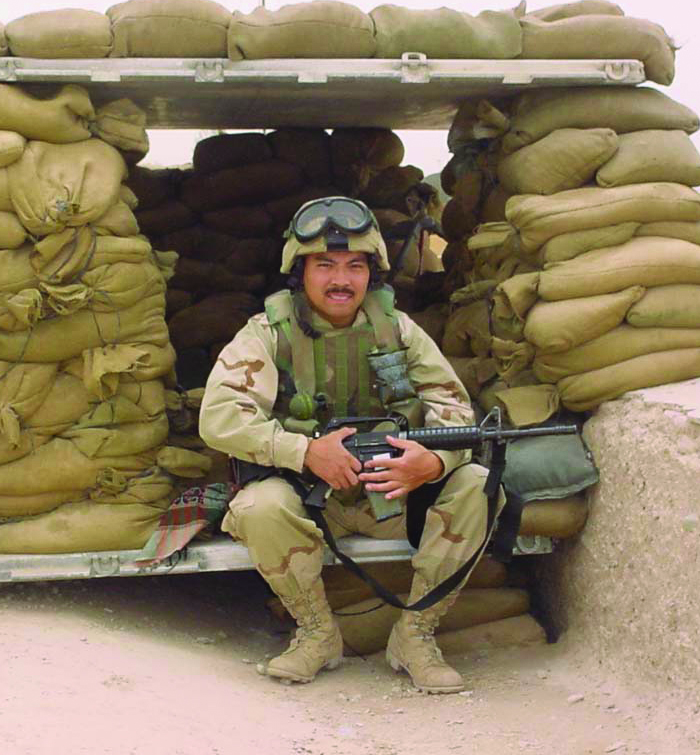
The son of Mr. and Mrs. Peter Guevara, from Pampanga, is a soldier in the U.S. Army. At the height of America’s war against terrorism, Peter looks at the brighter side and here he shares with us how his experience as a soldier sent to Afghanistan changed him.
Army life is hectic at times and I was overdue a vacation. I arrived in Houston, Texas, two-and-a-half hours late to catch a connecting flight to Las Vegas. As I disembarked, it was hard to miss the masses of people huddled around the few television sets scattered around the airport.
September 11 tragedy
I watched the images of airplanes flying into the World Trade Center with horror and disbelief. It all seemed so unreal; it was like watching a movie. As I watched the events of that day unfold, I knew immediately that as a member of the Armed Forces, my life would be affected somehow.
Taking my part
When I returned to my military post in North Carolina, I found that I was right. Heightened security was everywhere around the post, and there was a sense in everyone that we would be involved in whatever action the United States would take. We started to prepare for the inevitable as soon as I returned. Shortly after Christmas, my unit was finally told it would be going to Afghanistan to join the war effort. In mid-March 2002, the first elements of my military unit departed for Afghanistan. One by one I watched them leave, until my turn came in late April.
Forsaken land
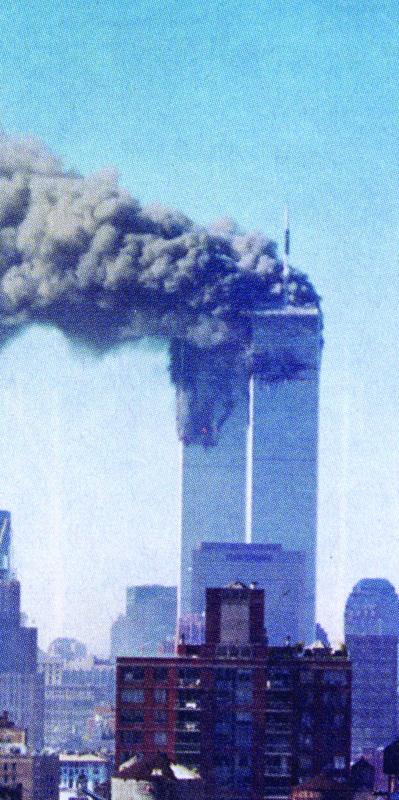 I left for Afghanistan with some feelings of apprehension. Little did I know what a lesson in cultural diversity I was about to receive. My first impression of Afghanistan was, “Why would anyone live here?” The land is arid and dry. The vegetation is sparse. Natural water is hard to find. Life is nomadic at best. Afghanistan suffers great extremes of temperature. The winter is bitterly cold and the heat in the summer is oppressive. The dust storms are also very hard to live in. Dust gets into everything, and at times it makes breathing difficult. The region is also very mountainous, so it is not easily traveled. There is little or no infrastructure. For weeks I wondered what the former Soviet Union wanted Afghanistan for when they invaded it some years ago. I found very few endearing qualities in this forsaken land until I interacted with some of the Afghan people.
I left for Afghanistan with some feelings of apprehension. Little did I know what a lesson in cultural diversity I was about to receive. My first impression of Afghanistan was, “Why would anyone live here?” The land is arid and dry. The vegetation is sparse. Natural water is hard to find. Life is nomadic at best. Afghanistan suffers great extremes of temperature. The winter is bitterly cold and the heat in the summer is oppressive. The dust storms are also very hard to live in. Dust gets into everything, and at times it makes breathing difficult. The region is also very mountainous, so it is not easily traveled. There is little or no infrastructure. For weeks I wondered what the former Soviet Union wanted Afghanistan for when they invaded it some years ago. I found very few endearing qualities in this forsaken land until I interacted with some of the Afghan people.
Their simple joy
Most of the people I saw were in the marketplace in the several towns I visited. It is pretty much where most activity in the villages occurs. People gather at the small stands scattered around. One thing that sticks in my mind is the children of Afghanistan. No matter where I went, the children were always smiling. Despite the harsh reality of their lives, the children of Afghanistan find joy in simple things.
They don’t have expensive toys to play with, and most of them have countless chores to do daily. Still, every child I encountered had that genuine sense of innocence that you find in children everywhere.
Living life to the fullest
Life for the people of Afghanistan is extremely simple. It’s a meager existence at best. Western conveniences are few and far between, yet the people of this poor nation live life to its fullest. It’s hard for them to miss things they don’t know exist. There are many in this country who have never seen a television set or a flush toilet. On one of my trips to a remote village, I realized that many of those I was interacting with had probably never been farther away from home than maybe four or five miles. They had never been any farther than they could walk.
Perils in Afghanistan
Afghanistan is still an extremely dangerous place to be. The country is riddled with land mines. Not a day went by without hearing at least one mine explosion. For the Coalition Forces in Afghanistan it is extremely difficult, if not impossible, to determine who is friend or foe. Those who are friends today might very well be foes tomorrow.
Assumed freedom
The war against terrorism goes on. I believe that the presence of the Coalition Forces in Afghanistan has made a difference, however. The women of Afghanistan are slowly starting to benefit from the Western presence. As they take a greater role in their society, life can only change for the better. Some women have been brave enough to stop wearing their burkas. The burka is a complete veil which women in some countries wear over their face. Many are going to school and many women have opened businesses in Kabul. Beauty shops were not a part of life under the Taliban rule, but now they are starting to appear. I believe that the future of Afghanistan lies in its women and children.
I left Afghanistan with mixed emotions. I was happy to be going home, yet sad at the plight of the people in Afghanistan. I will always have a greater appreciation of all that I have. I thought I had seen poverty at its worst when I was in Bosnia-Herzogovina for over eight months in 1996. I saw simple living when I went to Nigeria later. Neither place was comparable to Afghanistan.
Africa Still Beckons Me
By Fr Enrico Eusebio SJ
Nigeria is one of the largest and richest countries in Africa yet it has more problems than most. Its famous oil fields are in chaos  and it has just emerged from a series of military dictatorships which were very destructive and corrosive. At present it is faced with an entirely new danger: many Muslim areas wish to introduce Sharia Law, the
law based on the Koran, into daily life. Naturally the Christians are against this; for example a woman (not a man!) caught in adultery will be stoned to death. Being on mission in Nigeria today is no easy task though Fr Eusebio, in his story below, rightly looks on the bright side of life, as indeed a Christian should.
and it has just emerged from a series of military dictatorships which were very destructive and corrosive. At present it is faced with an entirely new danger: many Muslim areas wish to introduce Sharia Law, the
law based on the Koran, into daily life. Naturally the Christians are against this; for example a woman (not a man!) caught in adultery will be stoned to death. Being on mission in Nigeria today is no easy task though Fr Eusebio, in his story below, rightly looks on the bright side of life, as indeed a Christian should.
When I was a novice in 1986, the superior of the Jesuits in Thailand came to Sacred Heart Novitiate in Novaliches, Quezon City. During one of our recreation nights he shared with us about missionary work in Thailand. He invited us and encouraged us to consider the foreign missions in the future. That night I didn’t think about foreign missions at all.
Pope in Manila
Things were basically the same during the next few years of my formation. But that mode changed in 1994 when I was in third year Theology and soon to be ordained. The Pope was coming to Manila for the 10th World Youth Day in January 1995. Everybody, including me, was excited to see Pope John Paul II on Philippine soil for the second time! Who could forget that theme song, “Let us tell the world of his love”? In fact, during his 1981 pastoral visit, Pope John Paul II confided to us Filipinos his deep special desire to see us become the foremost missionaries of the Church in Asia.
My own offering
I recall that when I was a young boy I used to pass by St. Andrew’s Church in Parañaque, either on my way to school or during my free times. I would always pray, “Lord, I offer to you all my thought, joys and sacrifices of this day…” And when I entered the novitiate in 1986, my one clear desire was to offer myself to the Lord. Though the intensity of that desire in terms of feelings varied during the years of my Jesuit formation, that one clear desire for the Lord to “take me and receive me” never waned.
Ready to be sent
And so when the Pope told us that Jesus was sending us out to proclaim the Good News of God’s love and mercy to all peoples, I was listening to him as if it was Jesus himself speaking. That morning of his memorable final Mass with us, as he was delivering his homily, I was listening as if it were just the two of us present there at the Luneta, with him in the midst of the multitude of four million people. I remember murmuring within my heart at that very moment, “Here I am Lord, send me.”
Turning point
That very personal and communal experience of mine with the Pope, together with four million other people, became a turning point in my life. I desired to abandon myself to Him, in a rather “total” way, by being a missionary, yet, to Africa. However, there was something about Africa that beckoned me and yet repelled me. Africa, from my own perception, was the great frontier for evangelization, with people eager to hear the Word of God and to accept it. It was inviting me and challenging me to let go of the world I had enjoyed and loved. But the thought of leaving it behind and going to Africa also brought chills and fear in my bones.
Not new to Africa
I had been in Africa before, in 1984. My father worked as a certified public accountant at the Nigerian Ports Authority in Lagos from 1983 to 1986. During that span of time, all of us brothers and sisters took turns in visiting him. When I visited there for three weeks, I thought that was the end of my African sojourn. During that short period in Nigeria, I did not get malaria, but I brought home something else in my system, something which incubated within me for 10 years.
Final Decision
After the euphoria and great spiritual desires of the World Youth Day, I came back to my usual fearful, questioning self. “What if I am making a wrong decision to go to Africa? I won’t have my friends to turn to when problems will arise…” One night, after sharing my usual litany of doubts, Fr Charlie, my spiritual director, with his smiling eyes, looked straight into mine and in his usual non-threatening way, asked “Would you like to go to the missions or not?” After hearing those words from Fr Charlie, I really got tongue-tied. I said to myself, “Teka nga muna. Oo nga ‘no? Ano nga ba talaga?” I looked back at him, smiled and let out a relieved laugh. I said, “Yes, Father, I would like to go.” From that time on, I knew I wanted to go, and that I would go.
And so I wrote a letter to Fr Noel Vasquez, SJ, then Father Provincial, volunteering for an initial two-year mission in Nigeria. On the day of my ordination to the priesthood, April 20, 1996, I received the Lord’s confirmation when the Father Provincial announced my first assignment as a newly ordained priest.
Faithful in Nigeria
I arrived in Lagos on Friday, June 20, 1997. In the next two years of my missionary life, I had many joyful experiences with our parishioners and with the Filipino community there. But more than any particular experience, what gave me so much joy in being a missionary – being in a far away land, among the people whose culture is totally different from my own – was the conviction that I was responding to a call, and that I went with a lot of trust in God. I brought with me the consolation of knowing that I went to the missions on account of a deep desire to offer my life to the Lord. In Nigeria, I experienced a share in the dying and rising of the Lord, which every missionary experiences. In my experience, suffering remained what it is – painful, even if it is borne out of love. But it became an experience which made me stronger and my love for God more dedicated, more committed.
Bouts with loneliness
The most difficult months I experienced in the missions were the first two of my parish work at Christ the King in Lagos, where I was assigned in my first year. After the first week of my arrival, after all the excitement of touring around, I began to experience uncomfortable and disconcerting feelings. Being the only Filipino Jesuit in Nigeria, I felt so alone. It suddenly dawned on me that I was actually on the other side of the world, so far from home. One of my points of struggle in the missions was my pride and impatience. I knew missionaries go to the missions with the disposition of humility and openness to learn, and not as “saviors” of all. But even if I knew that, I was beginning to set my “agenda of evangelization” on my own terms.
Light unto my path
Those were some of the lowest points in my mission life. But what were most consoling and liberating for me were those moments when I felt the Holy Spirit working through me, helping me to be more patient, accepting the reality around me and those moments when I met people who blessed me with their own faith and courage in facing the tides of life. Some of these people were the lepers of Ossiomo Leprosarium, an hour’s drive from my parish in Benin City.
These lepers, even in their broken bodies and decaying flesh, never fail to give praise to the Lord in dance and song! Every time I would visit their cottages to bring Holy Communion, a man with a very bad case of leprosy which made him blind, upon hearing that I was coming with the Blessed Sacrament, would always exclaim with his hands raised in praise, “Father! You are welcome! Thank God, Jesus is with us!” He reminded me of the blind Simeon at the Temple who recognized the child Jesus and said, “Lord, now you let your servant go in peace…My own eyes have seen the salvation which you have prepared in the sight of every people: a light to reveal you to the nations and the glory of your people, Israel.”
It has been a while now since I came home from Nigeria. I have been praying that I may have the privilege once again of going back to the missions in Africa or in Asia, at the opportune time. I know that as I offer myself to the Lord. He is blessing me and this blessing means no other than His promise to be with me at all times, and behind me in every circumstance.
Blessed Are The Peacemakers
CICM Missionaries in Manila prepared this service for peace in East Timor and in the southern Philippines. We have slightly adapted it. It is particularly suitable for Lent as we pray for the healing of our broken world and our broken country.

All: (Please stand) Bless your people, Lord, who have walked too long in this night of pain. For the child has no more tears to cry, the old people no song of joy to sing, and the blood of your youth drains away in the gutters. The cry from the Cross is heard throughout the land. The pain in His nailed hands is carried by the worker. Terrible thirst is in the throat of the farmer. Too many women mourn the loss of their sons. And all the earth is turned into another Calvary. With your spirit, Father, we cry for peace. With your Spirit we struggle to be free. Bless us with the wisdom of our ancestors and the courage of our martyrs, that the resurrection of Jesus may be ours to claim and all people embrace the earth in the harmony of peace springing from justice. Amen.
A reading from the book of Exodus 3: 7-12
(Moment of silent reflection)
RESPONSORY
Leader: I have seen how cruelly my people are being treated (Ex 3:7)
All: Create in us an awareness, O God. Awaken us to a sense of urgency.
Leader: I have heard them cry out to be rescued from slavery (Ex 3:7).
All: Let us hearken to your voice, O God. Alert us to your promptings.
Leader: I have come down to rescue them and bring them out to the land rich and fertile.
All: O God, stretch your saving hand and hear today the cry of your poor.
Leader: Let us stand and sing: The Lord hears the cry of the poor.
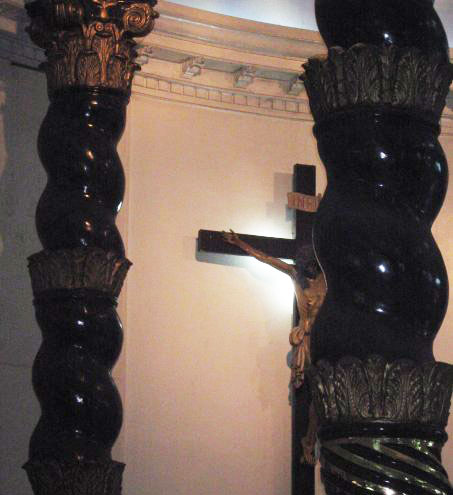
A reading from the Holy gospel according to Matthew (Mt. 5:1-10)
Leader: Xanana Gusmāo, now first president of East Timor, once asked his people to courageously defend themselves without resorting to violence in retaliation – a tall order!
Recognizing the violence in our own hearts, yet trusting in the goodness and mercy of God, we pray that all may be inspired and touched by the nonviolence of Jesus who taught us in the Sermon on the Mount: “Blessed are the peacemakers, for they shall be called sons and daughters of God. You have learned how it was said, ‘You must love your neighbor and hate your enemy’, but I say to you, ‘Love your enemies and pray for those who persecute you. In this way you will be daughters and sons of your Creator in heaven.’”
May I invite you to a pledge of nonviolence…(All)
Before god the Creator and Sanctifying Spirit, I vow to carry out in my life the love and example of Jesus:
- by striving for peace within myself and seeking to be a peacemaker in my daily life;
- by accepting suffering rather than inflicting it;
- by refusing to retaliate in the face of provocation and violence;
- by persevering in nonviolence of tongue and heart;
- by living conscientiously and simply so that I do not deprive others of the means to live;
- by actively resisting evil and working nonviolently to abolish war and the causes of war from my own heart and from the face of the earth.
God, I trust in your sustaining love and believe that just as You gave me the grace and desire to offer this, so You will also bestow abundant grace to fulfill it.
I Thought God Didn’t Care
By Elena Ang
Since my childhood days I’d always dreamed of acquiring a college degree when I grew up and being a successful professional one day. By a twist of fate, I failed to realize it due to financial constraints. Mother left us for her final resting place when I was barely six years old. At the age of thirteen, I took the yoke of caring for my sick father and three siblings. Though financially drained, I insisted on finishing high school without my father’s approval. Painfully, I recall those times I was driven out of the classroom for failure to settle school financial obligations. I reported to class on an on-and-off basis. I used to leave the classroom with a heavy heart, tears rolling down my cheeks.
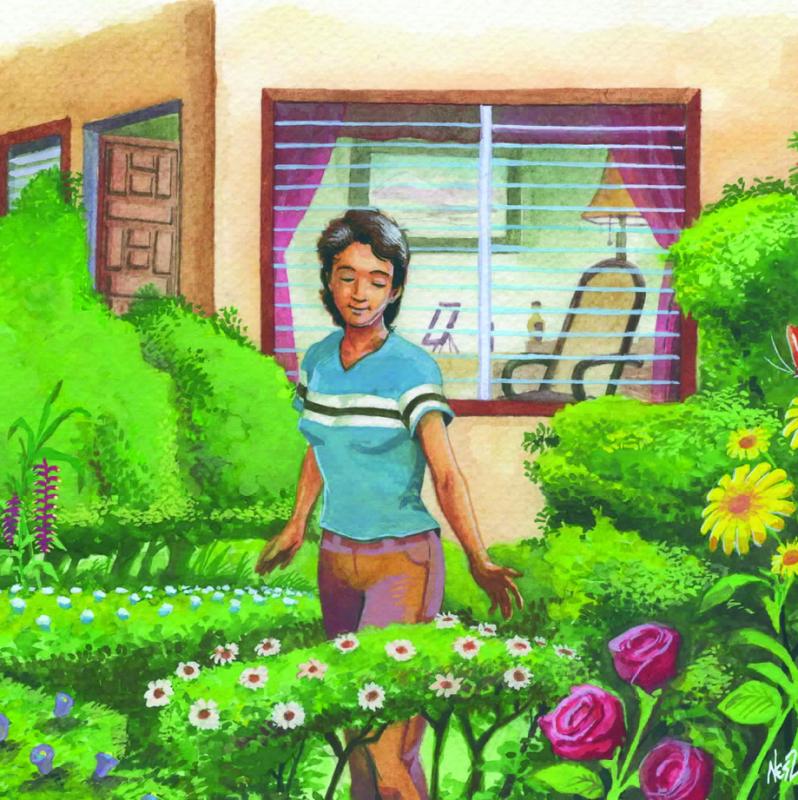
Playing the triple role of father, mother and big sister to three small boys wasn’t an easy game. Herding them to bed at night like motherless lambs, not knowing where to get their next meal the following day, shattered me into pieces deep inside. “If I could only provide them with better things in life,” I always told myself.
Then I came to a point where I could no longer hold on to my faith. Desperate, I said to myself, “If God does really exist, then He is a fake God, an uncaring God, a selective God. The chosen few enjoy extravagant food, enjoy themselves in excessive riches, while the vast majority are suffering from hunger and want. Where is fairness then? Where is justice? He plays favorites.” I blamed Him for the misfortunes that befell our family, held Him responsible for everything. While He was the unseen opponent, I was the desperately mad accuser. All I learned about Him in school and read in the Bible, I put aside. The God I earlier believed in was a jet-setting God who was on a long vacation, because He was nowhere to be found when I needed Him the most.
I am nothing
At the brink of despair I contemplated ending my life. But something from within reminded and jolted me to a sudden awareness that it was a dirty act, a grievous sin and that it offered no solution to problems at all. It was sheer cowardice. Then late one night, I once again confronted God and challenged Him to a “one-on-one” talk to clear matters up once and for all. Tears freely running down, I did all the accusing once again, heaping all the faults I could think of on Him. Then through the sound of silence, the words of Jesus from the gospel of John reverberated from within: Without me, you can do nothing.
Restored
Now, all I could remember was cooling off, my strength gradually ebbing, bringing my whole weight down to the floor and my chin settling comfortably on my arms. I found myself in that position upon waking up, as if I were a child, crying on the bosom of a caring parent. After that, I went to a lengthy confession. I attended Mass, went to Communion regularly to feed my long-starving soul. Yes, I needed Him. I had gone hundreds of miles away from God but took only one step back and He was there. He welcomed me back into His fatherly arms.
Indeed things happened for a reason. God did not cause my misfortunes. He did not send me the problems. He gave me strength to cope with them. Little did I know that those years of suffering would prepare me for another major test that I was yet to pass.
Late August 2001, I was diagnosed with breast cancer. Unfazed and undeterred, I talked to myself right after I learned of my plight, “Keep calm. Don’t panic.” I took things in stride, never considered it a case of life against imminent death but just a simple race where only a matter of guts and courage was called for. Most cancer patients I had known feared death like hell. Then I thought, “Strange – everybody wants to go to heaven but nobody wants to die.” Yes, cancer was in me. But I couldn’t get rid of it that easily, much less run away from it. Self-pity would not pay off. And I would not let fear stand in the way of living life to the fullest. Life goes beyond cancer!
My happy-face approach
Upon learning I had this dreaded disease in me I gave myself a briefing, warning my entire system to behave well, never to go erratic, particularly my immune system because if it does and goes wild, all other systems like the nervous, digestive and circulatory, will follow suit. Now, if I can talk to my orchids, sing and hum songs to them, why can’t I do that to my body parts? I passed the time doing little things. I sang songs, read books, wrote letters to friends of yesteryear, amused with jokes people around me, especially those sporting Holy-Week-Looks.
During the course of my hospitalization, I got upset only once, when I saw my brother crying at the corner of the hospital room, probably moved emotionally at my plight. I told him to pray instead of crying, for tears would not help me get well.
Thy will be done
On September 7, I underwent a four-hour operation. On the operating table I talked briefly to my surgeon then said, “Lord, please do the rest. I will do my best.” I am not used to reciting kilometric prayers. Total surrender to the will of God is a very wonderful and wholesome experience. I find complete peace of mind in it. After five days of rest, I was fully awake and in high spirits. Painless! I didn’t feel I had just been through a major operation. Fronting my bed was a crucifix on the wall. I took a long, meditative look at it and I found neither a symbol of gloom nor doom, but of light and life. It’s a PLUS sign. Victory! Resurrection!
After those trying and painful experiences in the past and as a breast cancer survivor lately, I have learned to steel myself against the cruel realities of earthly life. With God’s grace and the endless support of my siblings, friends, and all those around me, those who shared their blessings, offered prayers, sent words of comfort and encouragement through letters, cards and long-distance calls, those who paid me visits in the hospital and at home, and all my doctors, I have learned to survive. I have learned to live too with my cancer and will love it until it hurts as my partaking of Christ’s journey to Calvary and His crucifixion.
Lest The World Become A Desert
By Kris Mina
Malate Church and parish community is in the heart of Manila. It is aware of the growing catastrophe being caused by the destruction of the environment all over the Philippines and all over the world. Part of its response is to set up the farming community called Center for Ecozoic Living and Learning (CELL), an hour’s drive from Manila. There in Cavite, Kris and Roberto Mina have done something wonderful to our eyes – they have created a beautiful world which the parishioners and diverse visitors are invited to experience and learn from. Below, Kris tells us about this extraordinary experiment in promoting God’s Kingdom in a novel and vital way.
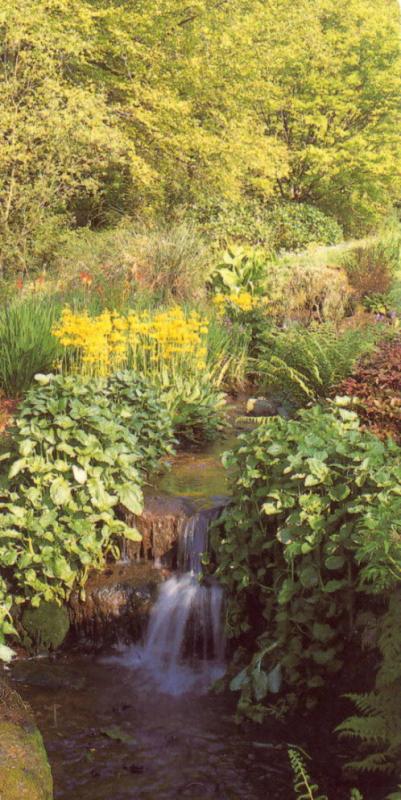
We are into organic farming, but we do more than just farming. Our family lives and works in an ecological spirituality center, my husband Roberto and I being staff members. We are on land not our own, with an area of 1.2 hectares, a quarter of which is devoted to receiving visitors who stay for a day or overnight. They usually ask at the beginning of their stay, “Where is the farm?” They look for vast rice fields and rows of vegetables and cash crops, and we have nothing much of that. The kind of farming we do is PERMACULTURE, which encourages food to be grown and forest, animals and flowers.
Permaculture
Permaculture tries to answer such questions as “How do I live and grow food without killing the soil, the air and the water? How can I farm and at the same time make the soil richer, and ensure that it will continue producing food for a long time? Can I do farming that doesn’t only feed the body but also the soul?” Permaculture means that the kind of agriculture we do is permanent, and the kind of culture we foster is long lasting.
Present day agricultural practices, while producing impressive yields in the short-term, lead to environmental disaster. Farming is no longer about bonding with the soil, learning from nature and celebrating nature’s ways. People are no longer at home with their real home which is nature.
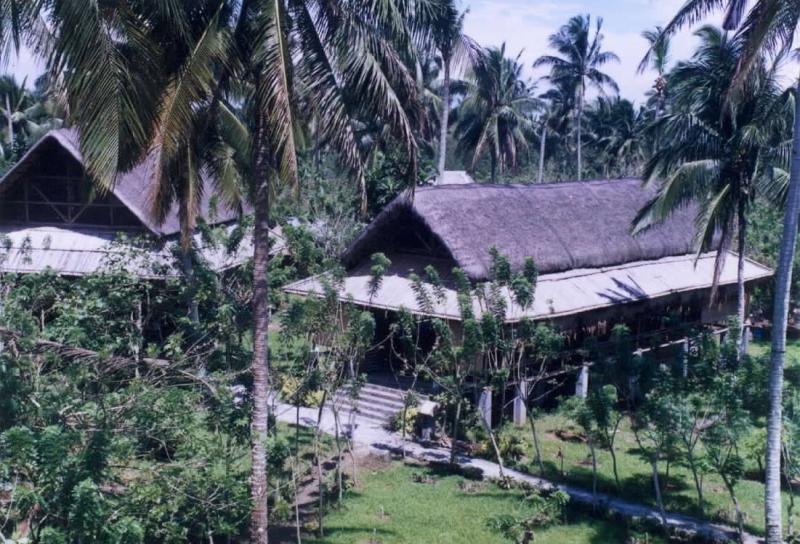
Ways of nature
In permaculture, we watch nature and learn from its ways. A forest offers the richest lessons. We devote 3/5 of the farm to growing a forest with a variety of native trees. 1,200 trees are now planted and serve as the habitat for all kinds of insects. With insects present, birds, frogs, lizards and spiders come, and so do other creatures such as snakes, which like to eat them.
Maintaining the food web
We have a pond that catches the rain, so that all these creatures have a drinking station and breeding place. At night some of them visit our vegetable patches and feed off the insects that attack our vegetables. There is no need for pesticides. We plant flowers alongside vegetables to control pests and weeds. We breed honeybees in the orchard to help in pollination, aside from being able to harvest their surplus of honey in the summer.
Our chickens range freely, and when we do put them in cages, they are in movable ones placed on the ground. The chickens are happy enough to do the weeding and manicuring, turning grass patches into ready garden beds.
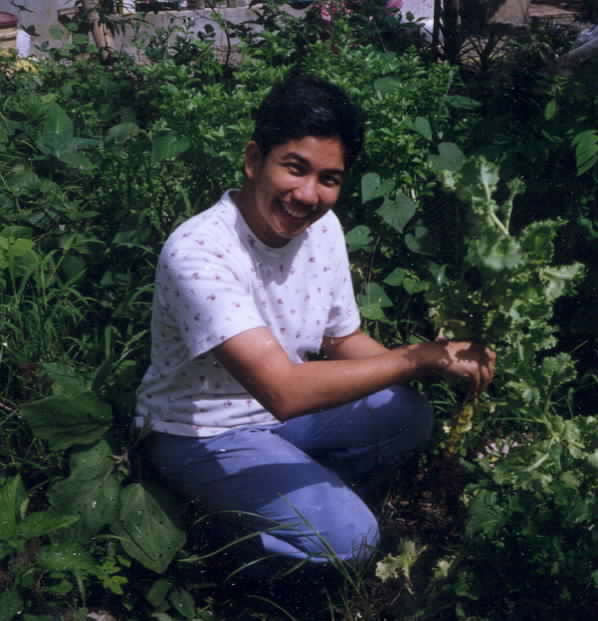
Waste Management
We are also happy with how we manage the waste generated by our living and working on the farm. Take for instance waste matter. All our sinks, laundry and shower areas are fitted with pipes that lead to the flower gardens. We are able to use the water again because we use only biodegradeable soaps, not detergents and disinfectants.
Human waste is another example. All our toilets are connected to the biogas digester, which, unlike the usual septic tank, separates the poo from the pee. The poo becomes fertilizer, the methane gas coming out of it serving as fuel for a stove. The pee is filtered and used to water our young trees.
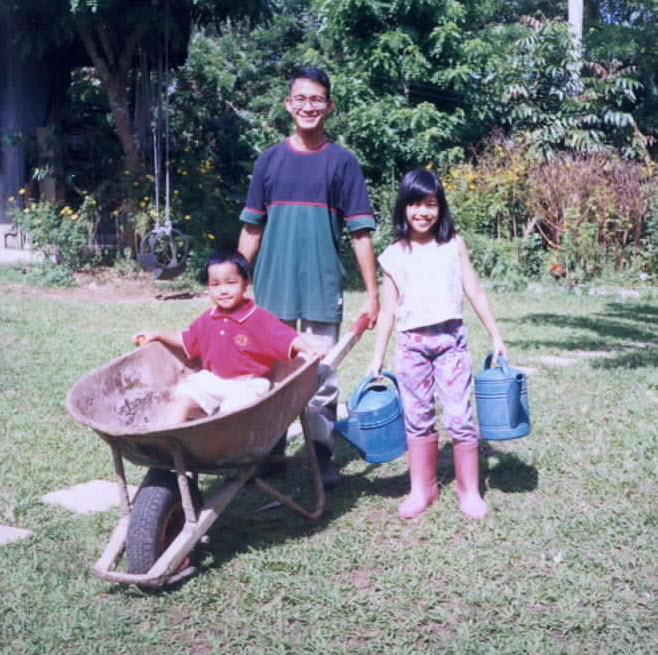
Responsible disposal
On the farm, you can do ordinary things with a smile: wash your hands and know that you are helping flowers bloom, use the toilet and make a forest grow.
As to the regular household trash, we separate the biodegradeables from the non-biodegradeables. Biodegradeables are the ones that eventually rot. Food scraps go to the dogs and chickens, peelings and wet paper are fed to the compost worms to be converted into vermicast fertilizer; and bones and shells are buried to be forgotten – and in time become fertilizer.
Non-biodegradeables are a challenge
Most non-biodegradeables are made of plastic. Until two years ago, we would lump them all together and wait for the garbage collector. Well, nearly three years ago the large dumps in Manila where poor families scavenge for junk collapsed from heavy rains and buried their shanties, killing 200 people. Talk about your candy wrapper committing mass murder! We said we didn’t want to participate in that kind of killing anymore. What then could we do?
We didn’t feel good sending them off to the dumpsites. And we didn’t feel good in burying them either. We know that a thousand years from now, when we’re long dead, those plastics will still be there, giving problems to the soil and all creatures living in it. We didn’t feel good burning them. We know that dioxin comes out of burnt plastics and it’s toxic for all animals to breathe in.
And so we wash our plastics – torn grocery bags, food wrappers, packaging of all kinds – dry them and keep them. Do we love them? Not at all! We’re just waiting for brilliant minds to find ways to use them safely. In the meantime, as they are clean and not a bit smelly, we keep them in cabinets and throw-pillows. Since we know that all plastics will stay with us, we have become choosy with what we buy, knowing that we are directly responsible for our choices and actions.
Spiritual response
And so we do more than farming. We see farming as a spiritual response. People in search of solutions to the ecological crisis. We know in our hearts that the ecological crisis is a crisis of LIFE. It is about death. We are awakened to the horrendous situation that the planet is in. To respond to the ecological crisis is to choose life and to participate in God’s mission to be life for the planet.
We humans seem to have lost our way. It is the activity of our species, one among 12 million, that is the main reason for the extinction of about 100 species a day. We say we love the Creator, but destroy his creation. The inspiration to do permaculture comes from having listened to the New Story of Creation.
This story is about how the Universe evolved very slowly to become host to our planet and all of life. Visitors to our farm get a chance to listen to the story. We all reach an insight that care for the earth is authentic when people abandon the idea of human superiority over all God’s creation. We are not the masters of creation. Each creature is a loving expression of LIFE and is entitled to live on this planet as humans do.
Belonging to the Earth
We need to know who we really are. We need to understand that if a loving, compassionate God waited to place us in the universe 15 billion years after the Big Bang, it was not because we were meant to undo what creation had laboured to achieve. All creatures around us are much older than humans. But we were the ones granted the heart and mind to give them their names, to understand how we all relate to each other, and to continue the work of creation.
So at the farm, we invite our visitors to look closely, listen, touch, smell and taste as they go for a nature walk. We invite them to help a bit in the farm, to do earth care work. When they get soil on their hands, we hope that something in their hearts remembers that they belong to the earth. When they appreciate the different creatures, we hope that they would allow the Earth to be a mother that teaches her children her ways. We would like to see the day when all six billion people on earth wake up to their role as an ally of the planet, not its destroyer.
Nature is my home
One college girl, 17-year-old, an urban dweller all her life, wrote this poem after staying a day with us:
I felt the cool wind on my face, skin,
Ruffling my hair.
I felt lighter, maybe lighter than I had ever been.
I forgot about the heat of the sun against my skin
And actually loved the way it felt.
I felt the earth, the soft earth caressing my fingers
And how amazing it felt on my palms.
Somehow during this day I felt I’d come home
To where I came from.
And then I realized I am home here in nature.
Nature is my home.
I guess the farm is bearing all kinds of fruits.
CELL is an NGO founded in 1999 by Columbans John Leydon, Frank Carey and Dom Nolan, together with a Filipino landowner, Elin Mondejar. It is partly funded by contributions from Ireland. Email:cell@info.com.ph
Make The World A Lighter Place To Live In
By Fr Niall O’Brien
More than thirty years ago when I arrived first in the Philippines and was learning the language in Kabankalan I was called out one night on a sick call. A young man had been stabbed. I can’t remember now what I did. I suppose I anointed him. But I do remember that as soon as it was clear that he was dead, his brother cried out to the heavens with a terrifying voice swearing that he would have revenge. I was profoundly shocked. Maybe I wouldn’t have been if I had known a little more about my own ancient Celtic heritage. Now I know that in the pre-Christian Irish tradition and even many years after St. Patrick Christianized Ireland, revenge was considered almost a sacred obligation.
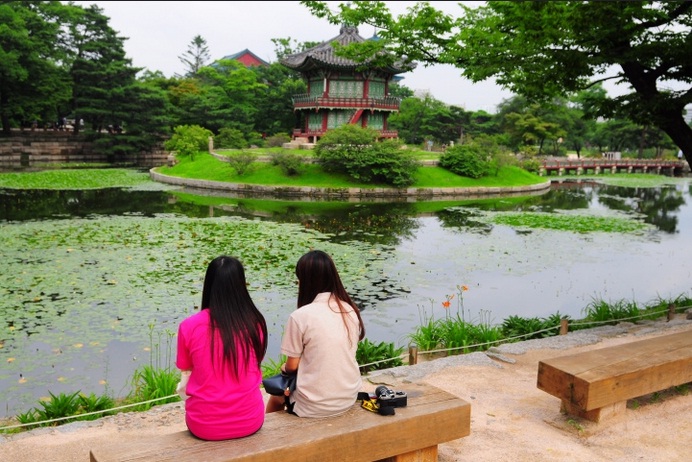
Photo: Benjo Rulona
Though many teachings of the Church cause me problems, I have never had any difficulty in seeing that forgiving one’s enemies is an absolute essential, a non-negotiable for being a disciple of Jesus. And if forgiving is a non-negotiable for a Christian, how much more so is putting aside revenge?
Though many of Jesus’ words can be interpreted this way or that and some of His statements are downright enigmatic, his teaching on forgiveness is consistent, continuous and as clear as the moon on a cloudless night: if you do not forgive your brother from your heart, my Heavenly Father will not forgive you.
Repentance is not enough
I started all this because of a little piece I had been reading recently from the late Anthony de Mello’s book entitled Contact with God, Retreat Conferences. You know the way it happens that you read something – maybe something you have already believed anyway – but the author has a way of stating it that drives the truth home with new force. Well this article had that effect on me. The article is called the Dangers of Repentance. De Mello was talking about the difficulty we sometimes have in believing that we have been forgiven.
Have you noticed that nowhere in the New Testament does Jesus tell us that in order to get forgiveness for our sins we must be sorry? He is not, obviously, excluding sorrow for sin. He just doesn’t explicitly demand it. Whereas we have made such a fuss about contrition; and how many penitents I have had who were bothered to distraction about whether they had sufficient contrition, whether their contrition was ‘perfect’ or ‘imperfect’ and such other largely irrelevant questions as far as forgiveness is concerned. And while we got lost in what Jesus did not explicitly demand of us, we conveniently overlooked the things that He explicitly and insistently demanded. He said, “If you want forgiveness from my heavenly Father, then you must forgive your brother.” That one condition was conspicuously absent from the conditions for a ‘good confession’ that were listed in our old catechism books. We were quite meticulous about examining our consciences and telling our sins to the priest and making an act of contrition and a purpose of amendment and fulfilling the penance given us. We were not explicitly told that more important by far than all of these, was that we forgive our brother any wrong he has done us; indeed, that if this were missing, our sins were simply not forgiven, no matter how perfect our contrition or how accurate our recital of our sins to the priest in the confessional.
First step to reconciliation
So we are back to square one. Forgiving those who have offended us. By the way, forgiving them does not necessarily mean becoming friends with them. That’s ‘reconciliation’ and that’s another day’s work. After all it only takes one to forgive but it takes two to reconcile. You can forgive someone but you can’t force reconciliation upon them or yourself. Forgiving is an act but reconciliation is a process and sometimes a long process. In this article I am talking not about reconciliation but about forgiveness which in its own way is a first step towards reconciliation.
Only by Grace
I think sometimes we enjoy not forgiving. We get some strange comfort in harboring the memory of an evil done to us or possibly to our family. We nourish that memory to keep it warm. Sometimes it becomes very hard to let go of that memory. We even feel that we are being unfaithful to our family if we “forgive” someone who did something evil to them. Surely it was this idea of being faithful to his dead brother that made that young man cry out his promise of revenge. What I am saying is that forgiveness does not come easily. In fact it’s a grace – a grace we need to pray for. So please do pray for it. In fact the Lord very nicely slipped it into the “Our Father” so that it will become a permanent part of our daily prayer: Forgive us our sins as we forgive those who sin against us. He knew we would find it difficult.
Blessed are the injured
I doubt if there is even one person reading this who has not been injured by someone else. Maybe you are saying to yourself, “But this person really did this evil deed and they really intended to do it. They did it with malice.” But that’s the point. It is precisely because they intended to do it and did it with malice that you have something to forgive. The strange irony is that they have put you and me in the way of gaining a grace. If they had not hurt us, we would not now have the opportunity of forgiving.
I often heard it said, “Ako ang mas matanda. Siya ang mas bata. Siya dapat ang maunang humingi ng tawad.” (S/he is younger than I am. S/he should make the first move.) I don’t think that is correct. I think the one who can make the first move is precisely the one who was injured. Only the injured one can forgive.
The twentieth century has been a century of great pain and sadness. The figure given for those killed in war that century is 160 million. Can you imagine what pain and hurt and unforgiveness lie behind all of that? My own little theory is that when we forgive, we not only lift a burden from our own heart but in some way we lift a burden from the earth, from the human race and make the world a lighter place to live in.
In his dying moments Jesus managed to gasp out the words, “Father, forgive them.” He had already forgiven them in His heart but He wanted us to know it and imitate Him.
Missionary On Horseback
By Fr Michael Doohan SSC
I have long been invited by Misyon to write my vocation story but I always had many excuses to delay it until one day I was cornered. The Misyon staff visited me at my convento in Cauyan, a three-hour journey from Bacolod City, the capital of Negros Occidental. Obviously, I didn’t have much choice but to tell them my vocation story so their visit would not be in vain.
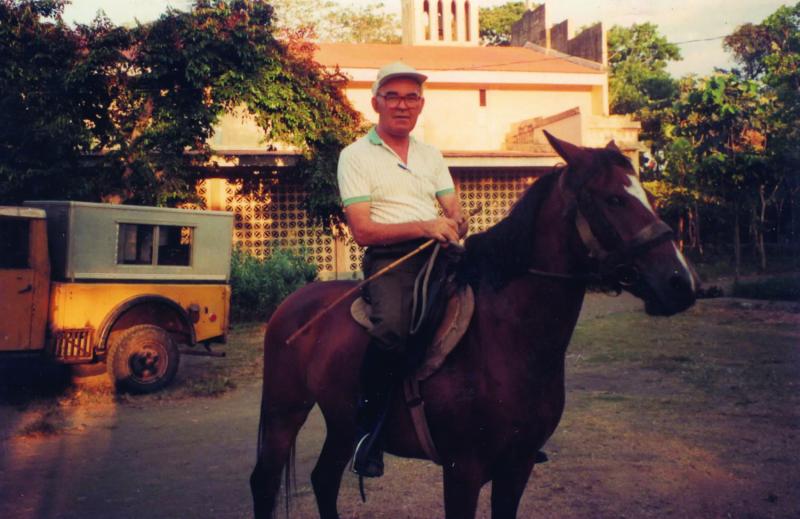
I grew up in County Clare, in the west of Ireland, with four brothers and five sisters. In a poor place like County Clare, farming was the basic livelihood of the people. Our parents taught us the meaning of hard work from an early age and saw to it that we all went to high school. There was only one bad word in our family and that was the word “lazy”. We all did our share – not while we were at school for we were expected to study then – but in the summer and during other holidays. All nine received a full secondary education with the exception of the eldest son, Patrick, who would run the farm.
Easy vocation
I suppose my vocation was easy in the sense that John, my elder brother, had gone ahead of me. After high school, when he announced at home that he was volunteering for the China Mission, as the Columbans were then known in Ireland, I thought he should see a psychiatrist. Just imagine somebody from the mountains volunteering as a missionary in China. He didn’t even know where it was. I really thought it was ridiculous.
John went to the seminary, which was equal to college here, while I went to high school. When I was in first year a visiting priest from St. Columban’s gave a talk in our class on the Chinese Missions. He started his talk with a poem written by another Columban, Fr. Patrick O’Connor.
Who has a blade for a splendid cause?
Who has a heart that’s true?
To live and to fight for the grandest thing
That man could dream or singer sing,
Or ever soldier knew?
The poem struck me and it changed me. I could see where John got caught. I didn’t want it, but it kept at me all the time. Finally I joined the Columbans.
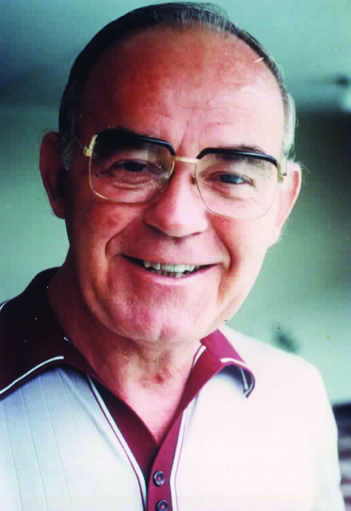
Neophyte
At the time I joined I had never been outside County Clare. Everything was new to me. But I was young and eager so it was easy for me to adapt to a new culture.
I was ordained in 1952 and the following year boarded a cargo ship in San Francisco bound for the Philippines. We had goats for company on our month-long voyage. When I arrived in Manila I was sent to Negros. When I was trying to learn the language on my own without any teacher, apparently I said to Fr. Frank Chapman, the superior in Negros at that time, that I’d better be sent somewhere where there were very few people who spoke English, so that I’d be forced to speak the local language. Fr. Chapman was quoted as having said to the late Fr. Eamonn Gill, who was very good at embellishing stories, “I am giving Mike Doohan his wish to send him where there is very little English and where there is very little of anything else either.”
Missionary on horseback
So Fr. Chapman sent me off on the 24th of June, 1953, to the mountains of Candoni, one of the towns in the south of Negros, during a typhoon. When I got there my predecessor, Fr. Michael McShane, had his bags ready and he left immediately. And there I was. The only thing I knew was that I knew nothing, completely innocent of the culture. The only available transport at that time was two horses: one for the priest and one for the fiscal. That did not worry me because I have liked horses since I was a little boy. My love for horses started probably when I was weaned – at the age of two or three.
Being a parish priest in a mountainous area like Candoni, horses are very useful. In fact up to the present, I still have horses. Horseback riding is also a very good exercise. At the age of 74 I still enjoy half an hour on horseback when I have the time. And talk about psychotherapy, if you want to overcome your problems, get on horseback, and they will be left behind. Nothing else: it’s just you and the horse.
Heart for the trees
Candoni should have been almost a virgin forest. But when I first came many rich people had logging concessions. They cut down trees in the forest almost every week. Trains of carabaos, loads of timber and rattan were being hauled in from the mountain. All for export off to the American market, or to the Japanese market, while those countries were preserving their own forests and buying cheaply form us.
I suppose it was there that I began to have a concern for trees and the forest. But what really struck me was one day when I was on my way to a barrio beyond Bantayan. My regular route was through the forest by horse. This time I had to leave the horse behind because, we could not get through. Trees were cut down, hundreds and hundres of them, just for burning, because it was too far to take them out for lumber.
The kaingeros then claimed the area with fallen trees. That really concerned me because in one hectare of forest knocked down by kaingeros the value of one tree alone would be bigger than all the rice they would reap from one year’s planting. After that they would abandon the area and move on to another.
This time, it’s education
Then in 1974 I was transferred as chaplain to SONEDCO (Southern Negros Development Corporation), a sugar milling company. There was no house, no chapel. So I asked a landowner if he could donate one hectare of land for the church. And he did. My first house was only 8 x 12 ft. For a bath, I went to a river down below; for my toilet, I went to the neighboring hospital. My mesmerized visitors had to sit on the floor. I was lucky when eventually a couple next door gave me four stools and a table. I lived there for 11 years and those years were in fact among the happiest in my life.
In my first year there in the sugar central, I saw many young people hanging around all day, doing nothing. The only thing I could think of was one thing I was interested in – mechanics. I thought of putting up a vocational training center for mechanics for them to make a living somehow. I went over to Cebu, got a teacher from a government school to teach. I also got in contact with Don Bosco, one of the best schools in mechanics. In 1976, the school was opened. The students studied free of charge. Foreign aid also came in the form of equipment and Dutch volunteers. The school became successful. A number of our graduates were even able to work overseas. When the time came for me to leave for a new assignment, there was no priest who knew enough about mechanics to take it over. So, we handed over the school to the government with the condition that it remain a free school and for the poor only. It is still like that.
Happy with Filipinos
Presently I am assigned in Cauyan, where I have been serving for 15 years now. Cauyan is a big parish with 30,000 Catholics. When I was asked where would I like to retire, I said, “I prefer not to retire.” I have plenty of parochial work to do here, not to mention the many friends I have come to love as my own family. Our Filipino people are generally happy people. They always smile, ready to give love and care. I am much more at home here than in Ireland where I now know very few people.
If you are going to have a happy life as a priest, it must be dedicated. A priest has to be happy with his environment, where he is assigned. He has to have time for the people, make himself an instrument for a happy community. And if we don’t say a minimum of prayers, there is no hope of continuing. This is what I have come to learn in my 50 years of being a missionary priest. And I thank all who have helped me along the way.
Our Hideaway
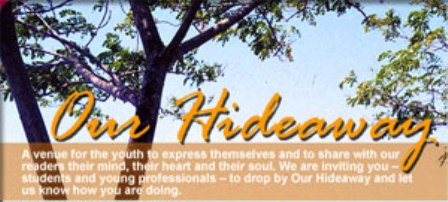
A venue for the youth to express themselves and to share with our readers their mind, their heart and their soul. We are inviting you – students and young professionals – to drop by Our Hideaway and let us know how you are doing.
Embarrassed
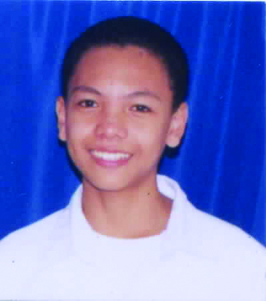
By Jun Daryl Zamora
A funny thing happened to me one afternoon in school. I was doing my usual school-garden work when my father, who is a teacher in our school, summoned me to do an errand.
While walking I was complaining. I had a headache and a cough at the time. My steps were heavy and my thoughts were as gray as the sky. But then I saw something that stirred my interest – the white-washed rocks that served as a boundary between an okra patch and the pathway. I knew it was unbecoming for a third year high school student like me to walk on them, doing his best not to lose his balance and fall, but I risked my poise in doing it anyway. At first I was really at ease. Then I stepped on an unsteady rock. It was round and it started to roll back and forth! Quickly I sought my balance, flinging my arms in the air. I knew there were people around me, and I was desperate not to fall! But…BLAG!
The fall
Luckily I stumbled on a not-so-stony path – but I fell all the same. I nervously struggled to rise, rubbing my reddening palms together. Then I realized the big embarrassment I caused myself. There were many students walking at the same distance but I was sure they saw me trip. Worse, there were two girls who certainly had the best view of my fall. I expected them to laugh or giggle. I expected everyone to laugh at the ‘clown’!
“Nauwaw ko…(I’m embarrassed…),” I foolishly told the girls in pretense jest and 100% embarrassment. I wanted to disappear! But I was there in flesh and there wasn’t anybody whom I could turn to. The world’s eyes seemed to stare at me! “God…” I mumbled under my breath, still grinning stupidly. But then I noticed something different about my surroundings. It was as if nothing happened. I saw only smiles, kind smiles. What a relief! So I continued walking, regaining my confidence with every step I took.
To learn from experience
Honestly, I couldn’t deny the fact that fate brought me to that embarrassing incident to teach me a lesson. Many times since childhood I had been amused at people who had their share of mishaps. Perhaps that’s why I expected everybody to laugh at me when I fell down. So now I have no reason anymore to laugh or even stare furtively at anybody who is in deep embarrassment. I know now how it feels to be utterly embarrassed.
My lesson
It was just a simple accident. God taught me a lesson with little pain. But certainly I will encounter more and tougher challenges in the future – even falls and embarrassment. They are the spice of life. And by then I will know just what to do. I will turn to God. “In you I take refuge, let me never be put to shame.” (Psalm 30:2)
Sound Of Silence
Perhaps you haven’t heard about the Trappistine Nuns in Mt. Matutum. They are a group of nuns who have chosen to live a life of frugality, simplicity and austerity, in a climate of silence and contemplation, away from city life. Thus, the Trappistines found their way to a beautiful cone-shaped volcano, Mt. Matutum, in South Cotabato, to build their first monastery in the Philippines.
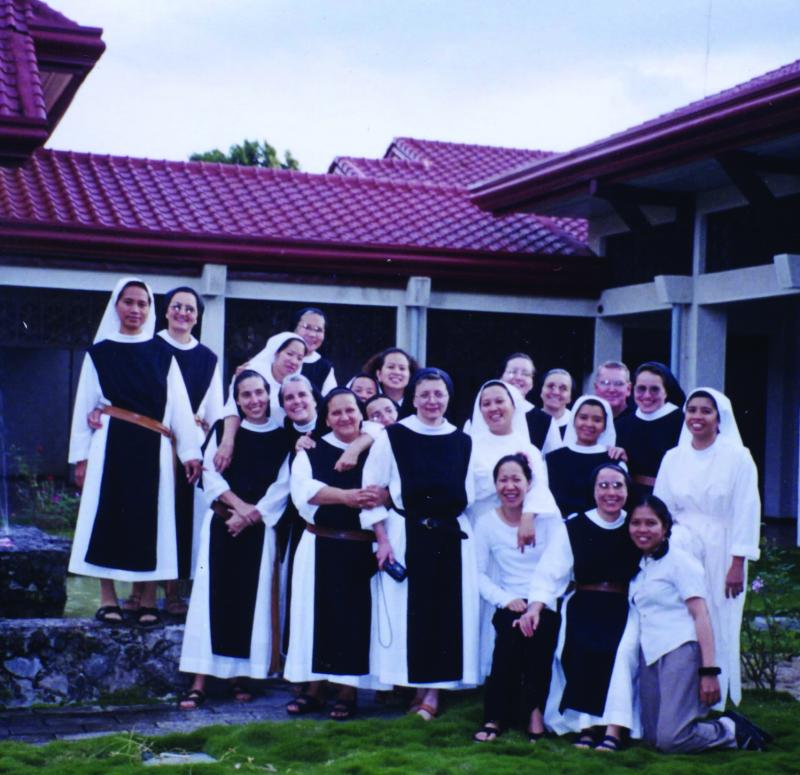
The nuns have been supporting themselves through a small cookie industry and producing and selling religious materials and greeting cards.
If you want to know more about them, write to Sr Anna De Simoni at Trappisitine Monastery, Landan, Polomolok, 9504 South Cotabato, Philippines. Tel/Fax: 083-225-6600; Cell No: 0919-7812077
“Actually, what matters about the monastery is precisely that it is radically different from the world. The apparent ‘pointlessness’ of the monastery in the eyes of the world is exactly what gives it a real reason for existing. In a world of noise, confusion and conflict it is necessary that there be a place of silence, inner discipline and peace…”
-Thomas Merton
That Famous Struggle With Satan
By Fr Pat Sayles, SSC
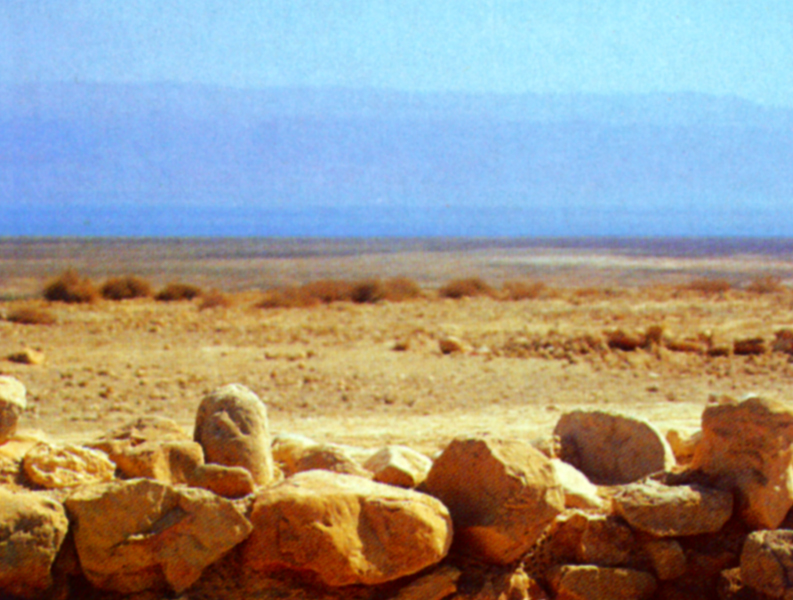
After Jesus was baptized by John at the River Jordan he was driven by the Spirit into the wilderness. The arid area that stretches westward from the River Jordan towards Jerusalem, and southward by the Dead Sea, is known as the Wilderness of Judea. We can surmise that it was here, in the harsh desert of Judea, that Jesus contended with the power of Satan that sought to divert him from his mission.
How intense this experience of inner struggle was, as Jesus sought to understand his Father’s will, we can only guess. It was clearly of great significance, and both Matthew and Luke seek to explain in detail the particular temptations which beset Jesus.
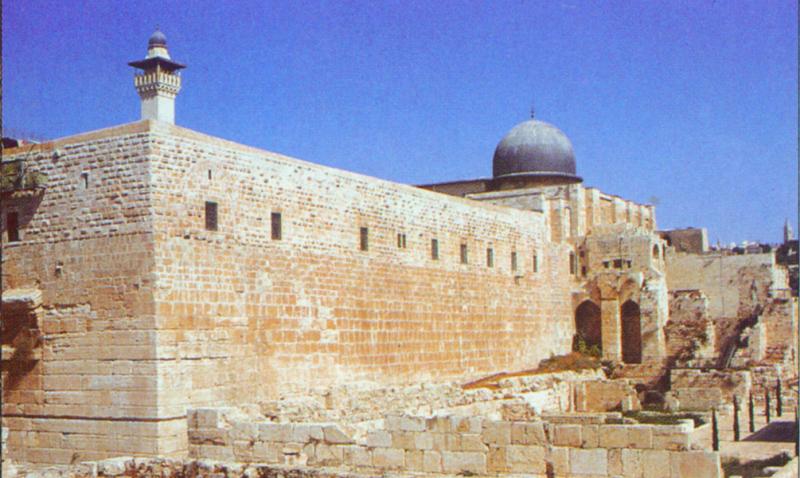
Danger lurking at night
The period of forty days recalls the forty days and nights which Moses spent alone face to face with Yahweh on the mountain in the wilderness. The wilderness is arid, but not completely desolate. Plants and animals have found ways to survive in this harsh environment. The desert is home to snakes, rodents, vultures, wolves and jackals. These would be some of the “wild beasts” mentioned by Mark. In the oppressive heat of day few are seen. But at night they are on the move.
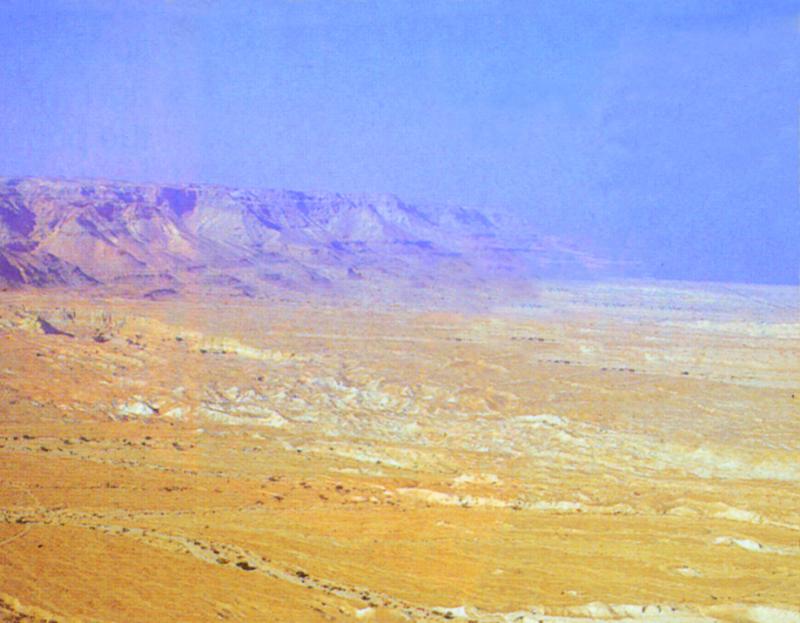
Where He once passed along
Jesus, like the animals, would have come to drink at a wadi such as the Wadi Qelt. In this narrow ravine in the desert west of Jericho caves abound, and possibly Jesus stayed there a while. According to one local tradition this is where Elijah the prophet stayed for many days in the wilderness, fed only by a raven which brought him bread.
The monastery of St. George, clinging to the sheer face of the gorge above this wadi, was built here in the fifth century, and still thrives as monastery today.
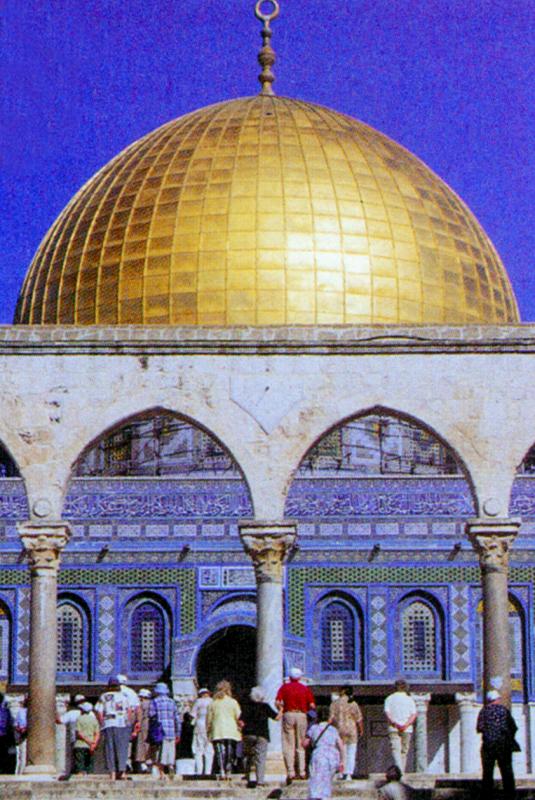
Mount of Temptation
Stones abound in this desert, and the temptation of turning these lifeless objects into food for a hungry world, of giving priority to the material needs of humanity, I easy to understand in this wilderness. It was met with the response: The world shall not live by bread alone, but by every word from God.
The sheer-faced mountain which towers high above Jericho is called the Mount of Temptation or Jebel Quruntul, Mountain of the Forty Days. From its height and location it is easy to think of it as the place where all the kingdoms of the world and their glory were offered to Jesus if he worshipped Satan.
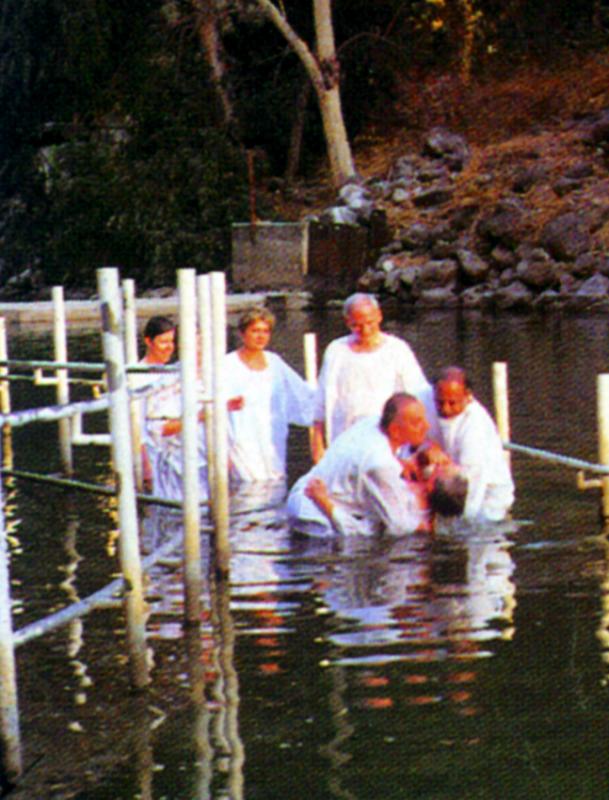
The third temptation takes Jesus to the Pinnacle of the Temple in Jerusalem. The southwestern corner of the Temple area, where the El-Aqsa Mosque stands today, is often considered the place referred to in the Gospels.
Who knows what agony of mind, what torture of soul, the Lord underwent in the wilderness? Yet on him, there in the desert, hung the destiny of each of us. From the desert Jesus returned to Galilee to begin his ministry.
Salamat sa Far East
The Columbans In The Philippines (1929-1950)
A book review by Fr John Schumacher SJ
Jesuit Fr Schumacher is a well-known historian of Philippine Church affairs. He has taken time out to do a review of the book: The Columbans in the Philippines (Vol. 1). It is a book which shows the extraordinary effect a small group of highly motivated missionaries can have, a book which gives encouragement to young Filipino missionaries setting out on the same task now to another countries.
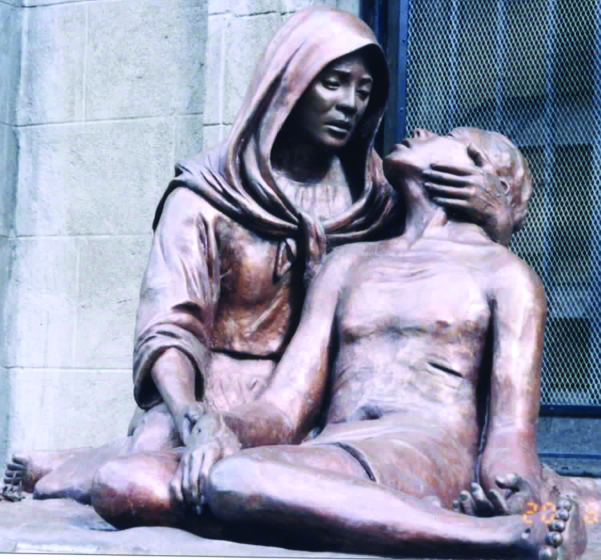
The somewhat complicated authorship reflects the fact that Fr. Martin Noone, the book’s principal author, died in February 1998, and it was left to others to try to make known the fruits of his research. It is understandable then that this book is not a fully integrated and complete history of the Columbans, for Fr. Noone had not yet finished processing his research, but it is nonetheless a valuable contribution to the historiography of the 20th century Philppine Church, so far consisting chiefly of accounts of the various religious congregations of women and men, particularly those which came to the Philippines only in the 20th century.
Fr. Noone’s qualifications for the history were twofold. He was himself one of the first Columbans to go to Mindanao in 1938, and spent many years in the Philippines. Secondly, he had previously written a scholarly account of the early Spanish voyages to the Philippines, The Islands Saw It, and subsequently done a frank, scholarly biography of Irish Archbishop Michael O’Doherty of Manila, which profited both from his access to excerpts from O’Doherty’s now lost diaries, and Noone’s own personal acquaintances with many of the events about which he wrote, as well as extensive research in Ireland, USA, and especially the Philippines.
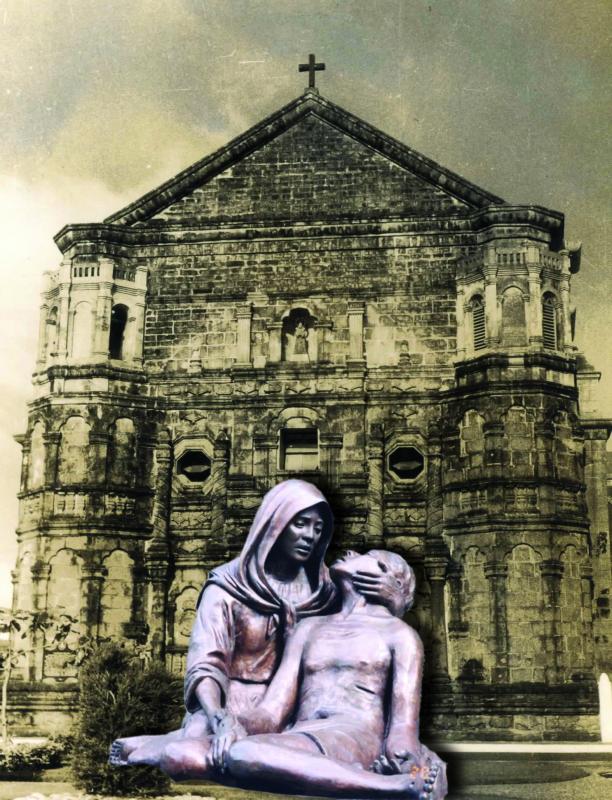
The present book, though in many respects more valuable, since the Columbans have worked in the numerous places in Luzon, the Visayas and Mindanao, could not achieve the same quality because of the death of the author. As the bibliographical data above indicate, the larger part of the book was written by Noone himself, though probably not in a final draft. Other parts are narratives of different Columbans in areas of which Noone did not have immediate experience, and there is an abundant primary material from the Columban archives in Ireland. Though unfortunately there is no preface indicating the precise way it was prepared for publication, the careful historian can note what is the backbone of Noone’s own narrative and what are compositions of other Columbans, which Noone had compiled but not yet fully integrated into his own narrative. Nonetheless, the editors have skillfully brought their materials into sufficient integration to give us a highly informative and readable, if not definitive, history of the Columbans, and of those parts of the Philippine Church in which they worked.
Among the more historically significant themes which emerge are the desperate need felt by many bishops for English-speaking priests; the important impetus given to the re-Catholicization of northern Mindanao, where even the decade earlier arrival of American Jesuits was proving totally incapable of reaching the constantly increasing number of immigrants; the enormous failure of the bishops until 1933, due to the opposition of the Apostolic Delegate Piani and the Spanish religious orders, to take advantage of the admittedly insufficient law permitting religious instruction in the public schools; the first abortive effort by Fr Ned McCarthy, in spite of the support of Protestant president Jorge Bocobo, to minister to the Catholic students of the University of the Philippines, beset as they were by a few key viciously anti-Catholic professors; the ecclesiastical opposition to McCarthy’s introduction of Catholic Action into welcoming non-denominational schools; the enormous success of his Student Masses in Sta. Cruz and Quiapo churches, where his English sermons reached 5,000 each Sunday at Masses celebrated by Filipino priests, but unable to preach in English, by then the language of college students.
Both ordinary readers, interested in the history of their Church and their country, and historians concerned to follow up and develop the many leads offered here, will find this book a treasure.
The book can be bought from the Columban Fathers at St. Columban’s, 1857 Singalong, Manila.
The Lost Oranges
By Sr Elinda Moron SSPS
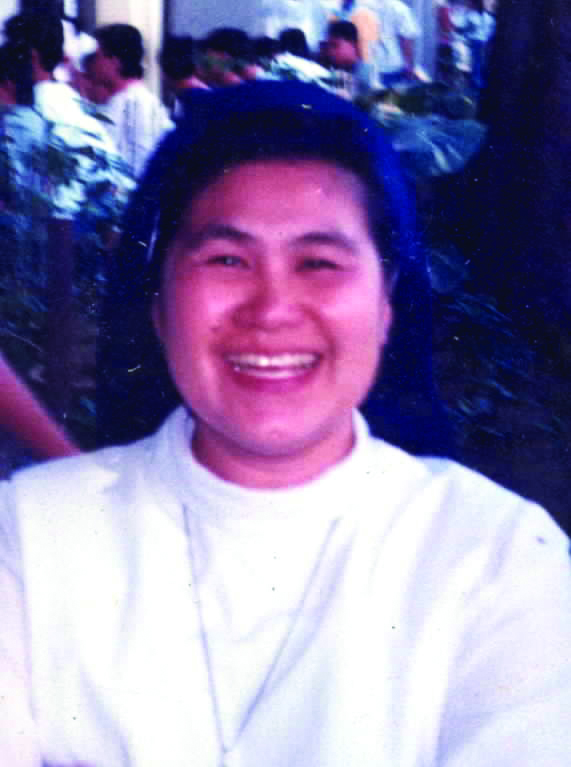
Sr Elinda Moron
I am a missionary assigned to a village called Kindege, about 500 kms from Luanda, the capital city of Angola. Only heavy-duty vehicles can reach Kindege. Thank God, there are no land mines, only friendly people waving at us as we pass by. In war-torn Angola, I have seen and felt God’s unconditional love, which goes beyond race, culture, age and gender. The people of Kindege are very peace-loving, caring with a faith in God that can move mountains. “Deus e grande” (God is great) is what they always utter in both painful and joyful situations.
Farming and hunting are the main livelihood of the people. Oranges, bananas and cassavas are their principal products. Their oranges are the sweetest I’ve ever tasted and are free from chemicals. In this area, animals are now very scarce because of the war. Most of the animals like deer, gazelle, buffalo and wild pigs, have fled into the inner forest for protection.
Good Harvest
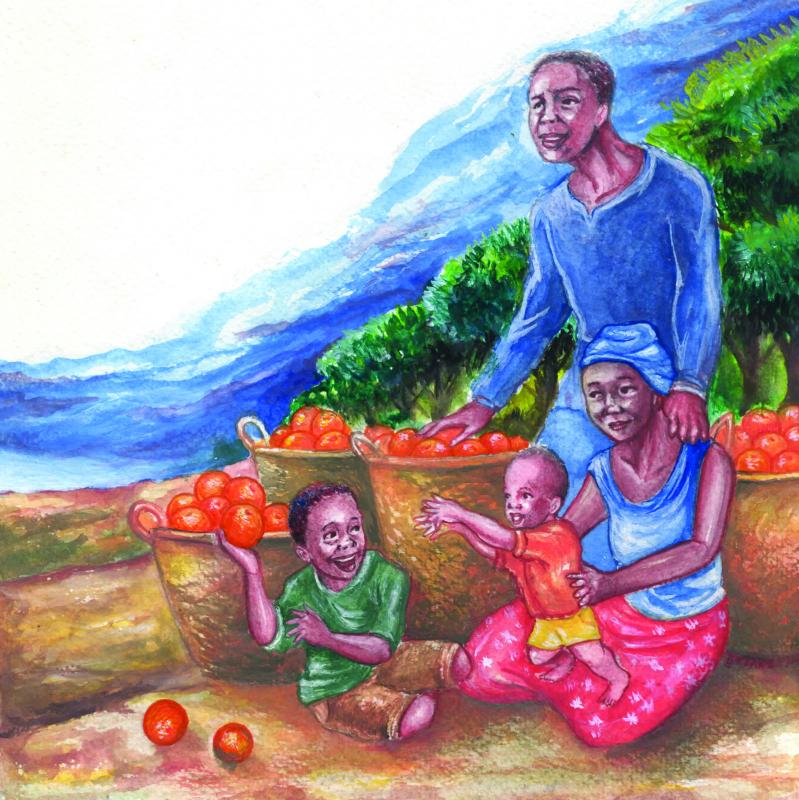
Seculo, a farmer, has around 100 orange trees which all the members of the family tend. For them, the orchard is their bread and butter. Fortunately, this season the trees bore plenty of fruit. Using cut branches, Seculo had to support the branches heavy with fruit so they would not break.
Rotten produce
Harvest time came and all the members of the family were there to gather fruit. Since they did not have enough containers, most of the harvested fruit was just left on the ground. I have never seen such mountains of oranges! These were ready for transport to the capital, but there was a sudden downpour. The trucks did not arrive to pick up the produce because of the muddy and slippery road. They waited a day, then two days, then a week. The road was not really passable. So the whole lot of oranges began to rot. It meant hunger for the family because the sale of the fruit would have meant they could buy a year’s supply of basic commodities like salt, sugar, oil, soap, medicine. I pitied the family, for their year’s work was in vain. But to my surprise the farmers responded to the situation without any bitterness. “Irma, Deus e grande.” “Sister, God is great. If He did not allow us to have the oranges sold this time, He will give us something else. He cares for us and will not allow us to be hungry.” Such trust in the Lord! I was ashamed of myself. In this situation I made a very urgent appeal to Him: “God, do something – and quick!”
God’s ways
A week after that, we were awakened by a commotion in the village. The hunters arrived and brought home meat and other forest products that would supply the village for the rainy season. Indeed, Seculo was right! God let the oranges rot, but He gave them meat and added more.
Receiving and giving
Now I realize why these people are very caring and loving among themselves and to strangers who are in their midst. In the very ordinary rhythm of their daily life, they are experiencing God’s love, enabling them to love in return. Their eyes, their ears and their hearts are so attuned to God’s love for them that in every situation, good or bad, they feel God’s love.
God’s loving embrace
This realization brought me to my second experience when I was hospitalized for almost two months in the Philippines. It was my first time to undergo surgery, and twice in two months, so I was afraid. Aside from the physical pain, I experienced loneliness, especially on nights when I was alone in my hospital room. In those moments of pain and loneliness I would remember Seculo and the loving people of Kindege. Then I would open my eyes, my ears and especially my heart to God’s loving embrace manifested in many simple but beautiful ways – the surprise visits of my brothers (I’m the only girl in our family) and my friends, the caring hands of the nurses, the phone call of my nieces and nephews saying, “Tita, Jesus is with you.”
If these are not God’s ways of manifesting His love, I don’t know what they are. I have felt His love because I was open to His love. I did not expect that He would love me as I wanted to be loved. I just allowed Him to love me the way He wanted to love me. And this enables me to love in return the people around me, even those who are sometimes difficult to love.
You may write to:
Sr Erlinda Moron SSPS
Arnold Janssen
Spirituality Center
F. Sotto St., BF Homes
1101 Quezon City
PHILIPPINES
The Scandal Of Child Soldiers
Based on an article by Declan Fahy The Irish Times
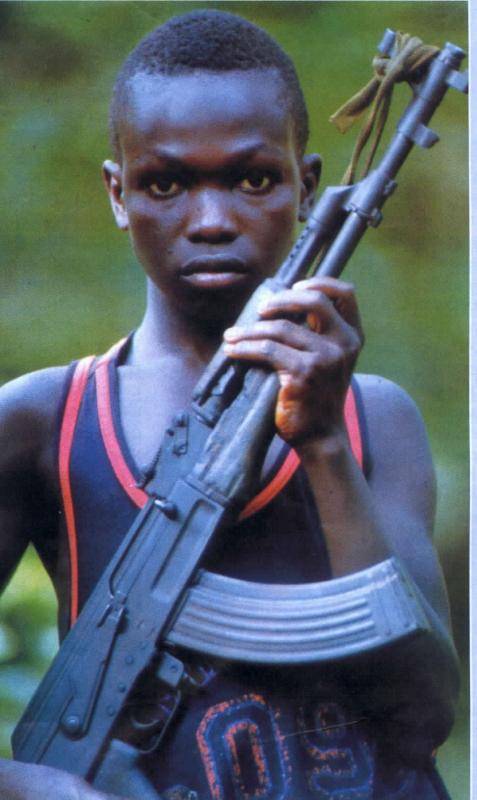
Sierra Leone is a part of the world where children have suffered the worst forms of child exploitation, now a global issue. It had an estimated 6,000 child combatants during the war. A further 5,000 were used as forced labor in rebel camps. The war was fought from 1991 between government forces and armed groups, including the Revolutionary United Front (RUF) and the Armed Forces Revolutionary Council (AFRC)
Children as young as seven were recruited by the RUF and the AFRC. But it was not only the rebel factions which recruited children. Up to 30 percent of government-sponsored Citizens Defence Forces (CDF) militias were between seven and 14. The children were made to take drugs, commit atrocities against their families and neighbors, and were forced to become sex slaves.
Recently, peace was declared in the country and many former child combatants, with aid from Caritas Makeni, are now being formally educated or are learning vocational skills.
Draft of violence
Worldwide there are, at any one time, 300,000 child soldiers serving in armed forces in 40 countries. A total of two million children have died in armed conflict during the past 10 years. Countries affected in Africa as well as Sierra Leone include Angola, Burundi and Uganda and probably most of Sudan.
In Sri Lanka, of 180 Tamil Tiger guerillas killed in one government attack, more than half were still in their teens. And a survey of wounded soldiers in Cambodia found that one fifth were between the ages of 10 and 14 when recruited.
What we desperately need is that all governments, including rebel groups, will adopt the UN protocol which makes it illegal for armed forces of all types to recruit people under 18. This also applies to using children to act as message carriers through enemy lines as that leaves the children vulnerable to being tortured.
Here in the Philippines, high school students undergo Citizens’ Army Training. Several active groups of insurgents use under-18s in their struggles.
Your Unfinished Song
By Fr James McCaslin SSC
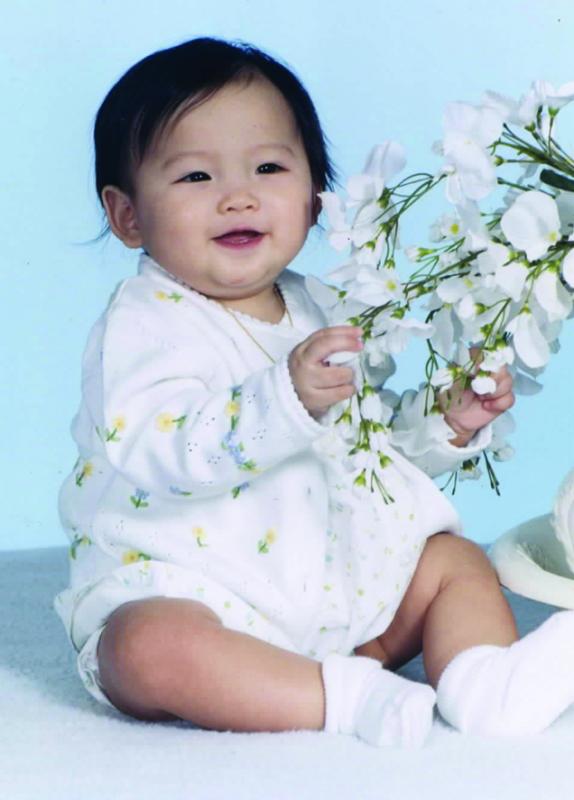
I’m a Catholic priest. I love you. I see you from time to time in the hospital where you have gone for an abortion, not because you are selfish or bad, but because you are pregnant, afraid and unsure. “I have no other choice.”
When I have heard your story of poverty, of a family of three or four at home in the Philippines, of temptation and loneliness, I cannot say that I approve of what you are doing but do feel compassion and understanding a little what brought you to this desperate point.
Although I’ve never met any of you who did not think that she killed her own baby, some of you had been to a doctor or a local clinic where you were convinced to think and say that you were “terminating a pregnancy”, not killing a baby, your very own baby at that.
But you knew better. Oh yes, you knew better. That’s why the last person you wanted to see and talk to was a Catholic priest. Or, for some of you, the one person you needed to talk to. I’ve been reading an eight-page Prolife Messenger in which I saw the following anguished letter of a mother to her aborted child:
Ten years ago yesterday, I carried you beneath my heart. Ten years ago today, I stopped the beating of your heart. I, your mother, the one who gave you life, also gave you death.
It’s been a decade and still my blood runs cold and I catch my breath whenever I hear the word “abortion”. There’s an emptiness inside of me that can never be filled, a chill that has never been warmed, a grief that will never end. To me you will forever remain an unfinished song, a flower that never bloomed. Even during your last fragile moments of life, I wondered, “Is my baby a boy or a girl?” The question ran through my mind again and again as I tried to block out the sickening sounds of you being sucked from my womb and my life... I simply nodded in defeat and sadness as this man in white patted my trembling hand and said, “Now aren’t you glad it’s all over?”
As I lay there... I could hear the nurses chattering about co-workers, new cars and clothes. To them the extermination of your life was simply a job... To me it was the darkest day I had ever known. “The Abortion” – the most heart-wrenching experience I had suffered in my 18 years; it was certainly your most painful experience in your three short months. It has taken me all these years to get over it.
Now... I realize this is something I will never get over. That fateful April day has replayed itself over and over in my mind like a horror movie one forces herself to watch, then cannot forget. Even in my distraught state of mind, I knew there were other options but I was too scared to consider them. Still a child myself, I “wasn’t ready” to be a mother: What I didn’t realize was that I was already a mother. When you became my child at the moment of conception, my love for you began at the very same time, and, although your life was ended, my love has never died.
Your silent screams have awakened me from sleep many times... and I have lain in the dark and mourned the loss of the baby I killed. I have even contemplated ending my life as I ended yours.
It has been ten years and I have still not forgiven myself. Have you forgiven me? Has God forgiven me...? In many nightmares over the years scenes of a tiny fetus in a trash bag haunt my subconscious. Often wakening in a cold sweat, I feel again the excruciating pain of the abortion itself — but those ten minutes were nothing compared to the ten years of pain I’ve lived with since.
For years my heart has ached to write you this letter, but the paper was covered with tears before I could begin. For some reason, though, tonight is different. Perhaps it is meant to help others avoid the agony I have experienced, to help girls “in trouble” as I was ten years ago, to realize that there are alternatives to abortion... if it does help prevent even one abortion, it will have served its purpose.
But, Baby, my real purpose in sending it to you is to let you know that I love you, wherever you are. And I am sorry. Forgive me.
Love,
Mommy